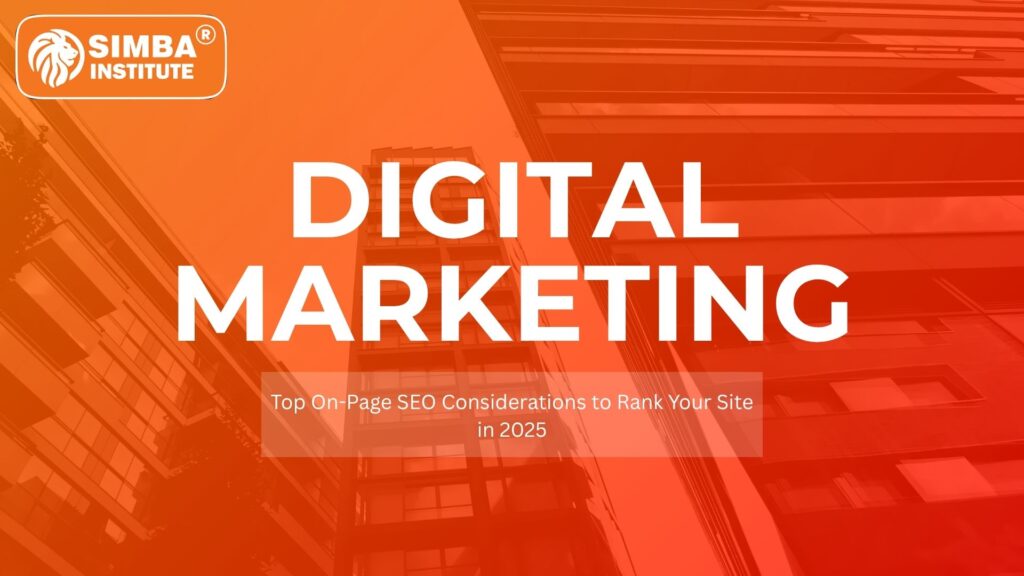Each year, Google refines its algorithms to provide improved, faster, and more pertinent search results. In 2025, the principles of on-page SEO are still essential but with a new focus on user experience, organized content, and AI-friendliness. To make your site rank higher this year, this is what you must prioritize.

The Helpful Content System of Google is more in the limelight than ever. In 2025, your content needs to:
Resolve user intent directly.
Be original, thorough, and well-organized.
Steer clear of fluff or filler content.
Be penned by specialists or demonstrate topical authority.
Tip: Employ tools such as Google’s “People Also Ask” and “Search Console” to optimize your content strategy.
Although keyword stuffing is obsolete, intentional use of main and
secondary keywords is crucial:
Place your main keyword in the title, URL, initial 100 words, and H1 tag.
Place related LSI (Latent Semantic Indexing) keywords organically.
Align your content with search intent — informational, transactional, or navigational.
Your title tag remains one of the strongest on-page SEO indications:
Keep it short of 60 characters.
Put your target keyword towards the front.
Make it click-worthy (CTR is important).
Meta descriptions don’t impact rankings per se, but they impact click-through rate. Write them as ad copy (less than 155 characters) and put keywords in naturally.
Short, tidy URLs assist both search engines and users in comprehending the page.
hyphens, not underscores.
Keep URLs short under 60 characters whenever possible.
Have the primary keyword included if it is sensible.
Headers structure content and aid in search engine comprehension of hierarchy.
Use one H1 per page — generally your title.
Utilize H2s for subtopics and H3s for supporting arguments.
Include keywords within headers where reasonable.
Linking to other pages on your site that are relevant:
Spreads authority around your site.
Improves crawlability.
Retains users longer.
Tip: Use descriptive anchor text — not “click here.”
Images improve user experience, but also contribute to SEO:
Use descriptive alt text with keywords (for accessibility and indexing).
Optimize images to speed up pages.
Use new formats such as WebP for quicker loading.
Google employs mobile-first indexing, and therefore your site needs to function perfectly on mobile:
Responsive design is a requirement.
Do not use popups that obstruct content.
Use clear navigation and legible fonts.
Test your pages using Google’s Mobile-Friendly Test.
In 2025, user experience signals such as Core Web Vitals impact rankings directly:
Largest Contentful Paint (LCP): Should take <2.5 seconds.
First Input Delay (FID): Should be <100 ms.
Cumulative Layout Shift (CLS): Keep it below 0.1.
Audit and optimize using tools such as Google PageSpeed Insights and Lighthouse.
Structured data makes it easier for search engines to understand your content and show rich results (stars, FAQs, etc.):
Add schema.org markup for articles, products, FAQs, reviews, etc.
Validate your implementation using Google’s Rich Results Test.
E-E-A-T has become an important factor, particularly for YMYL (Your Money, Your Life) content.
Display author credentials and bio.
Link to credible sources.
Regularly update content.
In 2025, AI technology such as Google’s Search Generative Experience (SGE) is transforming the way users receive answers:
Use conversational, natural language.
Reply to questions concisely and clearly.
Integrate structured lists, summaries, and FAQs in snippet opportunities.
2025 on-page SEO is about relevance, usability, and clarity. It is no longer solely about keywords — it is now about knowing people, their intention, and producing quick, helpful content in a format that can be easily digested by Google.
Keep on top of SEO trends, keep your site up to date through regular auditing, and ensure that you deliver the best possible experience. Google’s algorithms will come and go, but relevance and quality will always prevail.
Do you want a downloadable copy of this blog or an accompanying SEO checklist?
© 2025 Simba Learn. All rights reserved, developed by Customize Theme.